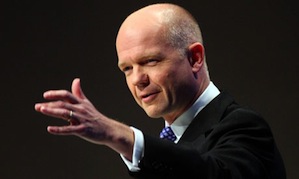.
.
.
British Parliament Wants Proof, Complicating Syrian War
Hague Rejected Demands, But Govt Finally Gives In
.
That’s not how the Obama Administration rolls, but British parliament has thrown a major monkey wrench into the Cameron government’s plans to join the US in the war.
.
 The lack of legal justification
for the war convinced Cameron he needed parliament to rubber stamp the
plan, and when they indicated they wanted real proof, it got pretty
messy, with Foreign Secretary William Hague vigorously arguing against
the idea, declaring that they’d already presented “the maximum amount of evidence” to parliament and had no intention of giving them anything more.
The lack of legal justification
for the war convinced Cameron he needed parliament to rubber stamp the
plan, and when they indicated they wanted real proof, it got pretty
messy, with Foreign Secretary William Hague vigorously arguing against
the idea, declaring that they’d already presented “the maximum amount of evidence” to parliament and had no intention of giving them anything more..
Parliament was insistent, however, and the Cameron government finally backed down and agreed to wait for the UN to finish its probe of what actually happened, something the US has angrily rejected.
.(Pro Forma...the Syrian government DID NOT do it)
______________________________________
From WIKIPEDIA:
The Iraq Inquiry, also referred to as the Chilcot Inquiry after its chairman, Sir John Chilcot,[1][2] is a British public inquiry into the nation's role in the Iraq War. The inquiry was announced on 15 June 2009 by Prime Minister Gordon Brown, with an initial announcement that proceedings would take place in private, a decision which was subsequently reversed after receiving criticism in the media and the House of Commons.[3][4][5]
The Inquiry was pursued by a committee of Privy Counsellors with broad terms of reference to consider Britain's involvement in Iraq between mid-2001 and July 2009.
It covered the run-up to the conflict, the subsequent military action and its aftermath with the purpose to establish the way decisions were made, to determine what happened and to identify lessons to ensure that in a similar situation in future, the British government is equipped to respond in the most effective manner in the best interests of the country.[6]
The open sessions of the inquiry commenced on 24 November 2009 and concluded on 2 February 2011.
In July 2012, the government vetoed the release of the documents to the Inquiry detailing minutes of Cabinet meetings in the days leading up to the 2003 invasion of Iraq. Concurrently, the British Foreign Office successfully appealed against a judge's ruling which had ordered disclosure of extracting a conversation between George W. Bush and Tony Blair days before the invasion. The government stated that revealing a phone call conversation between Bush and Blair before the invasion would later present a "significant danger" to British-American relations.[7] The million word report of the Inquiry is due to be released to the public by 2014.[8]
A public inquiry, chaired by the retired Lord Justice of Appeal Sir William Gage, reported on 8 September 2011 after three years of investigation.[16] The report concluded British soldiers had subjected detainees to "serious, gratuitous violence".[17] Army training manuals failed to explain that the five interrogation techniques used had been banned by the British since 1972, and were also illegal under the Geneva Convention.